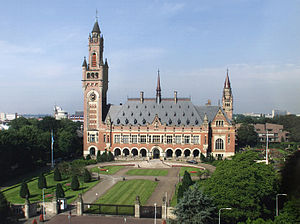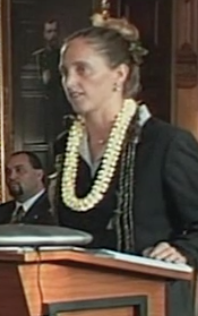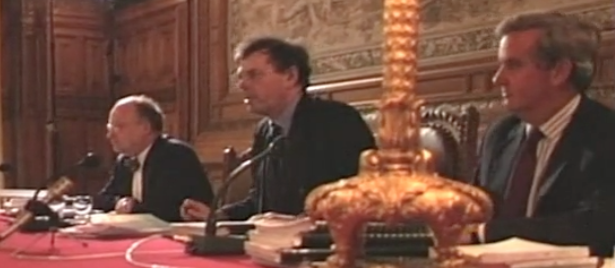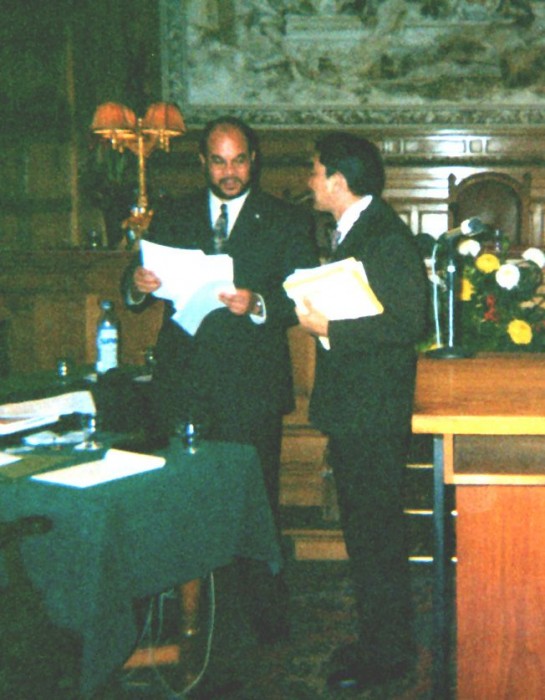Many people are not familiar with dispute resolution under international law and the role the Permanent Court of Arbitration (PCA) plays in international relations.

When the first International Peace Conference was convened in July 1899 in The Hague, Netherlands, the major States of the world were in attendance. Its first treaty—Convention for the Pacific Settlement of International Disputes, established a global institution for international dispute settlement called the Permanent Court of Arbitration. This international court predates the Permanent Court of International Justice established by the League of Nations from 1922-1946 and its successor the International Court of Justice (ICJ) established by the United Nations from 1946-present.
The PCA is not your conventional court that has permanent sitting judges, but rather it has a permanent secretariat called the International Bureau, which is headed by a Secretary General. After the PCA accepts disputes from parties, the Bureau facilitates the establishment of ad hoc Tribunals in order to resolve the disputes depending on the arbitration agreement between the parties and the applicable rules. The fundamental difference between a court with judges and a tribunal with arbitrators is that the arbitrators are selected by the parties based on their expertise in the area of the dispute. Judges may not be experts in areas of the dispute and therefore there is a need to rely on expert witnesses. Arbitration alleviates that requirement because the arbitrators themselves are the experts.
The PCA was initially limited to disputes between States that involved matters of public international law as well as arbitrating disputes over territorial sovereignty. By the 1930s, the PCA expanded its jurisdiction to include private parties that had a dispute with a State. One of these first cases involved a dispute between Radio Corporation of America, a private party, and China, being the State (RCA vs. China). Today, the jurisdiction of the PCA include disputes: (1) between two or more States; (2) a State and an international organization; (3) two or more international organizations; (4) a State and a private party; and (5) an international organization and a private party.
In 1999, a dispute arose between the Government of the Hawaiian Kingdom and a Hawaiian subject over the unlawful imposition of American laws in Hawaiian territory. The Hawaiian subject, Lance Larsen, was convicted under American laws and was incarcerated for 30 days, 7 of which were in solitary confinement. Mr. Larsen’s attorney, Ms. Ninia Parks, alleged that the Hawaiian Government was “negligent” by not taking affirmative steps to prevent the imposition of American laws in the Hawaiian Kingdom. She also alleged that the Hawaiian Government was a violation of its 1849 Treaty with the United States. Article 8 of the treaty states, “and each of the two contracting parties engage that the citizens or subjects of the other residing in their respective States shall enjoy their property and personal security, in as full and ample manner of their own citizens or subjects, of the subjects or citizens of the most favored nation, but subject always to the laws and statutes of the two countries respectively.”
After negotiations in Honolulu, an arbitration agreement was reached and on November 8, 1999, it was submitted to the PCA for acceptance. The arbitration agreement provided the allegations:
“(a) Lance Paul Larsen, a Hawaiian subject, alleges that the Government of the Hawaiian Kingdom is in continual violation of its 1849 Treaty of Friendship, Commerce and Navigation with the United States of America, and in violation of the principles of international law laid [down] in the Vienna Convention on the Law of Treaties, 1969, by allowing the unlawful imposition of American municipal laws over claimant’s person within the territorial jurisdiction of the Hawaiian Kingdom; and
(b) Lance Paul Larsen, a Hawaiian subject, alleges that the Government of the Hawaiian Kingdom is also in continual violation of the principles of international comity by allowing the unlawful imposition of American municipal laws over the claimant’s person within the territorial jurisdiction of the Hawaiian Kingdom.”
 As part of the International Bureau’s due diligence into the status of the Hawaiian Kingdom as an independent State under international law, the PCA’s Secretary General Van Den Hout made a formal recommendation to David Keanu Sai, Agent for the Hawaiian Government, to provide a formal invitation to the United States to join in the arbitration proceedings. This would have one of three outcomes—first, the United States would dispute the existence of the Hawaiian Kingdom as a State and the PCA would terminate the proceedings, second, it could join the arbitration in order to answer Larsen’s allegations of violating his rights that led to his incarceration, or, third, it could refuse to join in the arbitration, but allow it to go forward.
As part of the International Bureau’s due diligence into the status of the Hawaiian Kingdom as an independent State under international law, the PCA’s Secretary General Van Den Hout made a formal recommendation to David Keanu Sai, Agent for the Hawaiian Government, to provide a formal invitation to the United States to join in the arbitration proceedings. This would have one of three outcomes—first, the United States would dispute the existence of the Hawaiian Kingdom as a State and the PCA would terminate the proceedings, second, it could join the arbitration in order to answer Larsen’s allegations of violating his rights that led to his incarceration, or, third, it could refuse to join in the arbitration, but allow it to go forward.
 In a conference call held in Washington, D.C., on March 3, 2000,
In a conference call held in Washington, D.C., on March 3, 2000,  between Mr. John Crook, United States Assistant Legal Adviser for United Nations Affairs, Ms. Parks and Mr. Sai, the United States was formally invited to join in the arbitration. It wasn’t until a couple of weeks later that the United States Embassy in The Hague notified the PCA that the United States will not join in the arbitration, but asked permission of the Hawaiian Government and Mr. Larsen’s attorney to have access to all pleadings, transcripts and records. The United States took the third option and did not deny the existence of the Hawaiian Kingdom as a State.
between Mr. John Crook, United States Assistant Legal Adviser for United Nations Affairs, Ms. Parks and Mr. Sai, the United States was formally invited to join in the arbitration. It wasn’t until a couple of weeks later that the United States Embassy in The Hague notified the PCA that the United States will not join in the arbitration, but asked permission of the Hawaiian Government and Mr. Larsen’s attorney to have access to all pleadings, transcripts and records. The United States took the third option and did not deny the existence of the Hawaiian Kingdom as a State.
After the PCA verified and recognized that the Hawaiian Kingdom did exist as a State under international law with a legitimate government and that Larsen is a Hawaiian subject, steps were then taken to form the Tribunal. Mr. Keoni Agard, Esquire, was appointed by Ms. Parks, on behalf of Mr. Larsen, and the Hawaiian Government to serve as the Appointing Authority to work with the PCA in order to secure the appointment of three arbitrators. As the Appointing Authority, Mr. Agard was given a list of arbitrators provided by the PCA for each of the parties to select. The Hawaiian Government selected Professor Christopher Greenwood, QC, and Ms. Parks selected Dr. Gavan Griffith, QC. These two arbitrators then recommended the appointment of a Presiding Arbitrator, Professor James Crawford, SC, which both parties agreed to.

The Hawaiian arbitration fell under the PCA’s jurisdiction as a dispute between a “State and a private party.” The dispute was not about the existence of the Hawaiian Kingdom as a State under international law, but rather centered solely on whether Larsen could sue the Hawaiian Government for negligence by allowing American laws to be imposed in the Hawaiian Kingdom that caused his incarceration. The Tribunal stated to the parties that in this dispute the United States is a necessary party in order for Mr. Larsen to maintain his suit against the Hawaiian Government. The procedural questions that were given to the parties to answer in its written pleadings is whether or not these proceedings can continue without the participation of the United States. The Tribunal cited three international court cases that came before the ICJ and focused on necessary third parties as the precedence—Monetary Gold Removed from Rome in 1943 (Italy v. France, United Kingdom and the United States), East Timor (Portugal v. Australia), and Certain Phosphate Lands in Nauru (Nauru v. Australia).
 After written pleadings were submitted, oral hearings were held at The Hague on December 7, 8, and 11, 2000, and the Arbitration Award was filed with the PCA on February 5, 2001. The court concluded that the United States was a necessary third party and without their participation in the arbitration proceedings, Mr. Larsen’s allegations of negligence against the Hawaiian Government could not move forward.
After written pleadings were submitted, oral hearings were held at The Hague on December 7, 8, and 11, 2000, and the Arbitration Award was filed with the PCA on February 5, 2001. The court concluded that the United States was a necessary third party and without their participation in the arbitration proceedings, Mr. Larsen’s allegations of negligence against the Hawaiian Government could not move forward.
A common misunderstanding was that the dispute between Mr. Larsen and the Hawaiian Government centered on whether the Hawaiian Kingdom continues to exist as a State. It was not. The PCA recognized the continued existence of the Hawaiian Kingdom as a State because the United States, who claimed to have sovereignty over the Hawaiian Islands, did not refute the continued existence of the Hawaiian Kingdom when it had an opportunity to do so. The only claim that the United States had over the Hawaiian Islands was through American legislation and not a treaty. The PCA is very much aware that international law only allows annexation by treaty and not through a State’s municipal legislation.
Of significance in these international arbitration proceedings is that the Tribunal in its Arbitration Award acknowledged “that in the nineteenth century the Hawaiian Kingdom existed as an independent State recognized as such by the United States of America, the United Kingdom and various other States,” and the PCA recognized the continued existence of the Hawaiian Kingdom as a State in the twenty-first century.
To see the PCA’s explicit recognition of the Hawaiian Kingdom as a State go to the PCA Case Repository of Lance Larsen vs. The Hawaiian Kingdom, and scroll down to name of respondent, “The Hawaiian Kingdom (State),” who is represented by “Mr. David Keanu Sai, Agent, Mr. Peter Umialiloa Sai, First deputy agent, Mr. Gary Victor Dubin, Second deputy agent and counsel.”

Aloha, I find this this part of the article quite interesting, “the PCA expanded its jurisdiction to include private parties that had a dispute with a State. One of these first cases involved a dispute between Radio Corporation of America, a private party, and China, being the State (RCA vs. China). Today, the jurisdiction of the PCA include disputes: (1) between two or more States; (2) a State and an international organization; (3) two or more international organizations; (4) a State and a private party; and (5) an international organization and a private party.”
Is it possible we could see Hawaiian Kingdom vs. TMT or any other entity who’s county is a Treaty partner with the Hawaiian Kingdom and is in violation that Treaty????
I find item element (5) very interesting. An international organization vs. a private party: If there were a case whereby a church in hawaii advises one of it’s members to move away for his betterment, to a place like say California, in order to avoid the hardship in his occupied homeland, could this possibly be a case, to file for a grievance against the church? The key question here is, if the church is considered an international organization? Would there be a worthy/lawful grounds for filing a lawsuit of denationalization, and loss of homeland?
Aloha Frank, I don’t think a church is an international organization (IO) but for the sake of argument let’s say it was an IO. The PCA’s procedures require the complainant to get the IO’s consent through an arbitration agreement to proceed in the PCA venue. Without the IO’s consent the arbitration would not happen. I believe the bigger picture of this article and the previous article is that the PCA, which is a recognized court gave explicit validation that the Hawaiian Kingdom exists as a state and it has an acting gov’t.
Because of the PCA’s validation, the acting gov’t could if they so chose, utilize the ICJ to start the HK’s de-occupation. Unlike the PCA, the ICJ’s procedures do not require consent of the parties in order to proceed. The ICJ is more of an adversarial proceeding like the ones we are more accustomed to seeing. MHO
Mahalo no ia oe e Kekoa, for your take on the possibility of this happening. I am sure in due time, proper recourse will be spelled out for those seeking an answer to denationalization and loss of homeland. Given the unlawful US occupation, It seems to me worthy, of inquiry for redress at some future time.
Good clarification. And once again, think about it; it all makes sense!
How much more do we have to wait until we take this in war crimes to courts and also for racial discrimination by taking my nationality as a pure kanaka who are the victims in this whole situation. Remember if you are from the pass future!!! I mean the year of 1776 and above. In the time of our king kamehameha da great. This is true and correct. It’s time to stop this thing about one drop of blood this is really a discrimination man made and it’s just to get other to by pass the truth and mix this all up like its has been for years time to end this forever. Pala’aina Kaniela nae’ole na’auao on maui
Aloha brotha, I am small part koko. I would like to help you and other Maoli. What is your name? My email is dylanodog@gmail.com. Email me please.
Well, that settles the attempts for OHA in their Con-con Nai Aupuni and their move to establish the Hawaiian Kingdom Government, since it is already established, it’s time we look at establishing a court to hear our cases and to resolve many cases involving the incarceration of our people from 1890’s to the present…ALL WAR CRIMES against individuals by a state i.e. The USA…a state.
Good job on educating us on the finer points…meanwhile, Lance needs help…who is going to help him since his case and name is being used in many instances, he deserves something for his efforts.
Dr. Sai,
The PCA stated explicitly in 12.18 that due to the US not consenting to the trail the PCA therefore lacked the jurisdiction to determine the status of Hawaii as part of or separate from the United States. I was going to take you on your word and include you in a research paper. I can’t even justify buying your book at this point. Quit spreading misinformation. The US not attending doesn’t translate to the Hawaiian Kingdom being recognized by the PCA.
Long live the Kanaka Maoli
Colton, Procedurally if the PCA did not recognize the existence of the HK as a Nation state it would be barred from accepting the complaint and would have no choice but to have it dismissed. The fact that the PCA moved the case into arbitral proceedings in order to form a Tribunal which reviewed pleadings and heard oral arguments definitely proves the PCA recognized the HK’s continuity as a Nation state. The Tribunal was made up of highly qualified legal experts and they understood this. It’s a given. Their reasoning for 12.18 of not having jurisdiction was pursuant to the Third Party rule. They could not make a ruling if the ruling would affect the Third Party since the Third Party was not there to defend it’s self. It would be a violation of their due process. That is why you need to look at 13 thru 13.4 where the Tribunal is recommending fact finding proceedings instead of arbitration. The Third Party rule does not apply to fact finding proceedings.